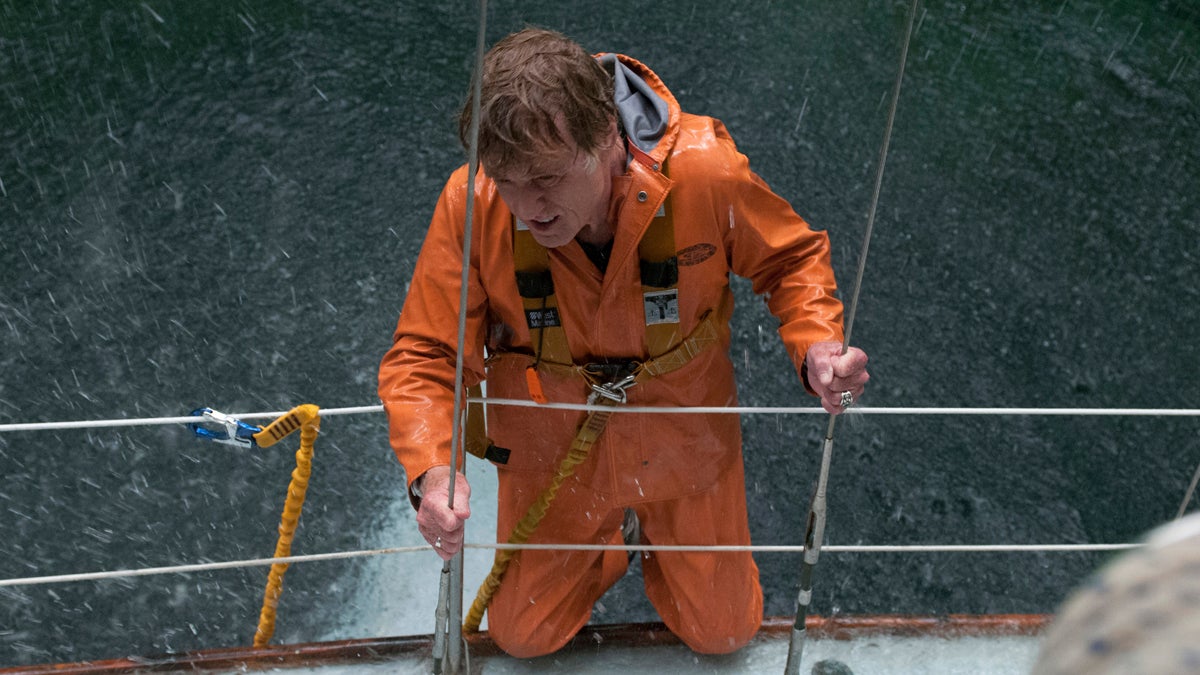Even when all is lost, there is still hope for those who choose

Robert Redford stars in J.C. Chandor's "All Is Lost." (AP Photo/Roadside Attractions, Richard Foreman)
“All Is Lost” is like life itself: compelling and difficult, with an ambiguous ending. The two-hour film depicts a harrowing shipwreck, telescoping eight terrible days for the anonymous, stoic Our Man, played by Robert Redford. We are trapped on board in an increasingly hopeless situation as he conjures his way through wave after wave of trouble. With no scene changes and scant dialogue to distract, with the relentless roar of the sea as backdrop, we can only observe and retreat into our own desolate experiences. It doesn’t matter who Our Man is: We fill in the gaps with ourselves.
EDITOR’S NOTE: The following may contain spoilers.
—
“All Is Lost” is like life itself: compelling and difficult, with an ambiguous ending. The two-hour film depicts a harrowing shipwreck, telescoping eight terrible days for the anonymous, stoic Our Man, played by Robert Redford. We are trapped on board in an increasingly hopeless situation as he conjures his way through wave after wave of trouble. With no scene changes and scant dialogue to distract, with the relentless roar of the sea as backdrop, we can only observe and retreat into our own desolate experiences. It doesn’t matter who Our Man is: We fill in the gaps with ourselves.
He awakens in his cozy berth somewhere in the Indian Ocean. The Virginia Jean‘s cabin has taken on ankle-deep water from a gash made by an errant shipping container, which is leaking tiny black sneakers across the sea. He’s far from land and completely alone.
Supremely self-possessed, he seals the hull with a sail, slinging himself over the side to make the repair. A storm boils up, tossing the damaged sailboat like a wet towel in a tumble dryer, snapping the mast. In response, he dismantles the radio and his phone, uses precious fresh water to wash the salt from the circuits, and spreads everything out to dry. He intercepts a signal, but his S.O.S. goes unheard. It seems nothing he does makes a difference.
Yet he persists. Why? What does he know? Or is he simply unable to yield?
Another storm knocks him unconscious, a momentary release from the screaming ocean. The silence brings relief, but Our Man soon recovers, deploys the life raft, cuts the tether, and watches the crippled Virginia Jean disappear.
Redford’s weathered face communicates eloquently, but not extravagantly. Just a tiny change at the eyes or the corner of the mouth hints panic, despair, and then inspiration, another straw to grasp. Our Man wastes little energy on anger and none on self-pity. He loses his composure only twice, rights himself and presses on. How? Could we?
Cracking a book on celestial navigation, he teaches himself to use a sextant, a long-unopened gift, never glancing at the enclosed card. He discovers that he’s drifting into a shipping lane, and sets off flares alongside two massive ships. They pass on, oblivious.
He rigs an ingenious system for drinkable water that produces only a few sips. He catches a fish, which is gulped from the line by a bigger fish. At last he acknowledges his plight, writes a farewell note, folds it neatly into a glass jar and drops it over the side.
Then he sees a single spot of light, close to the water. Rousing, Our Man frantically tears pages from a book, crumples them into a plastic container, and sets it alight. Waving madly, he tosses on more paper and fans the flames, which quickly overtake the raft. Surrounded by smoke, he jumps into the moonlit sea.
So is all lost? Was his struggle for naught? And what of ours? Is surrender the answer after all? The conclusion is ambiguous, a final collaboration between Our Man and ourselves. What happens is clear; what it means is not. It is all up to us. Just like life.
WHYY is your source for fact-based, in-depth journalism and information. As a nonprofit organization, we rely on financial support from readers like you. Please give today.

